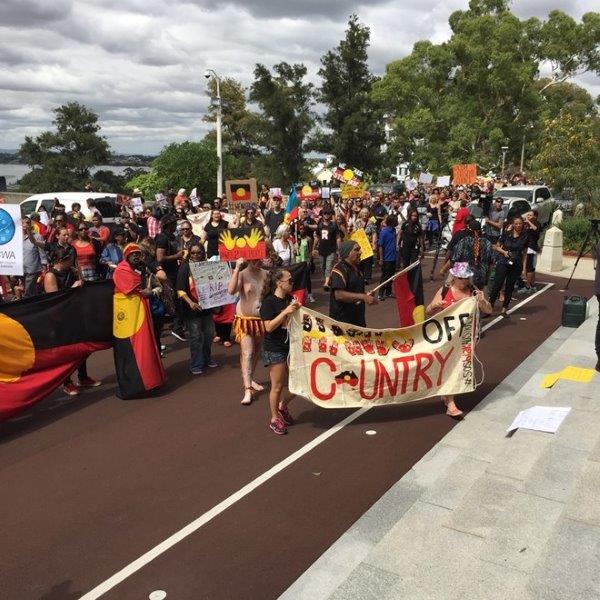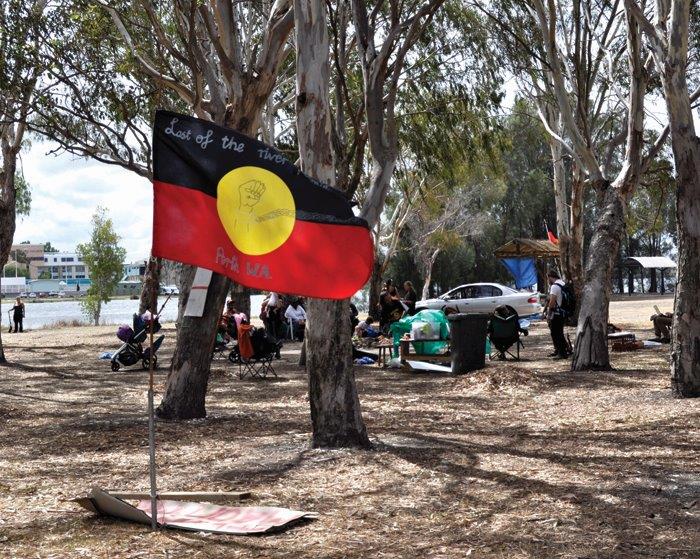As the Uniting Aboriginal and Islander Christian Congress (UAICC) prepares to celebrate its 30th anniversary on 29 May this year, its members and supporters enter, yet again, an emotional struggle to protect their human rights.
On Close the Gap Day, 19 March, hundreds of people marched from Forrest Place in Perth’s CBD to Parliament House in West Perth, to voice their concerns over the planned closure of 150 remote Aboriginal communities around Western Australia. Last year, the Federal Government announced it would pass on the responsibility of funding remote Aboriginal communities to the states. In turn, this led to an announcement from the State Government that it could no longer afford funding to these WA communities, and that it would be cut.
The announcements have caused anger, frustration and devastation amongst Indigenous Australians and the wider community. Even more hurt was caused when Prime Minister Tony Abbott suggested living in an Aboriginal community was a lifestyle choice, and that Australia could no longer afford to fund those choices.
Rev Sealin Garlett, chair of the WA Uniting Aboriginal and Islander Christian Congress, disagrees.
“Indigenous people have a deep connection to our land. This is not just a ‘lifestyle choice’, but part of our cultural and spiritual identity. We need to be on country to look after it,” he said.
Sealin feels that one of the biggest hurts in this announcement is the lack of consultation with the Indigenous communities involved.
“I think it’s been a very painful omission, about life, and about the demeaning of the spirit of Aboriginal people when they’re left on the outskirts of decisions that affect their lives, affects their children, affects their heritage and it breaks connection to their spirituality.
“Sad to say, it’s like a bullying approach, it’s like ‘you have no coexistence of this place. We own, run and dominate the situation on this land now. You do as we say.’”

The Uniting Church in WA and the UAICC have both expressed their concern over the closure of remote Aboriginal communities and are calling on the Australian Government to move to a process which consults with Indigenous communities, rather than forcing their closure in a top down approach.
“We call on the Federal and State Government to reconsider their approach to remote settlements, and engage upon a consultation with remote communities about the best way to deliver services to them,” said Rev Steve Francis, moderator of the Uniting Church in WA.
Shortly after the announcement was made by WA’s Premier, Colin Barnett, a ‘refugee camp’ was set up on Heirisson Island – or Matagarup as it’s traditionally known – in the spirit of the Nyungar Tent Embassy which has been set-up on the island in previous years. Organisers say the space was declared open for any Indigenous people who will be made refugees in their own land as a result of these decisions – and their supporters.
These supporters have been camping on the site despite being told they can’t stay, and despite attempts from police to force them to leave. Their message is clear: Aboriginal Australians must not be forced off their own land.
While the UAICC isn’t involved in the planning of this peaceful protest, they do support their message. And they have strong concerns about what will happen to people if communities are closed down.
“These people connected to these outstations, connected to these communities, go back thousands of years,” Sealin said. “I think it’s going to mean, for me from a distance, that these people are going to relive the stolen generations all over again. I think this is going to be devastating and I think a lot of people are going to be hurt by this.”
The UAICC are concerned that no plans have been put in place for people who will be affected by these closures. When people are pushed into regional towns, the communities they are forced to move into will also struggle with new demands in terms of housing, education and health facilities. They feel that the government has made no attempt to understand the needs of Indigenous Australians and the affect these closures will have on their social, mental, spiritual and physical lives.
“I just hope, trust and pray that this is still a conversation that will be deepened by our talks together, to be able to come into the areas that are affected, and be able to work through in an amicable way for all,” said Sealin.
Celebrating Congress
On 29 May this year, the Uniting Aboriginal and Islander Christian Congress (UAICC) will mark its 30th anniversary. Its history, though, extends way before 1985. In the late 1800’s Aboriginal missions connected with the Presbyterian, Methodist and Congregationalist churches began operating around remote Australia. Current Indigenous theology highlights that God was already at work in the land and its people before Christianity was introduced. The Uniting Church in Australia now acknowledges the pain and trauma caused by past mistakes and in 1997 made a formal apology to the Stolen Generations.When the three churches combined in 1977, all of these ministries came under the one umbrella of the Uniting Church in Australia.
While the UAICC, or Congress as it’s lovingly called, wasn’t an official organisation of the Uniting Church in Australia until 1985, in 1979 a Christian revival took place in Aboriginal communities around Australia, sparking the need for a national Aboriginal Christian organisation. Rev Charles Harris, an Indigenous minister from Townsville, North Queensland, organised a national meeting designed to open ideas and conversations around creating such an organisation. The idea was that it would develop an Indigenous theology and would be a voice for Aboriginal people both in the church and in the wider community.
Charles devoted his life at the time to travelling around Australia inspiring Indigenous Christians to become part of this organisation. Charles passed away in 1993. His wife, Rev Dorothy Harris- Gordon remembers the time as an exciting period in their lives.
“Charles was a man of vision and dreams,” Dorothy said. “He had dreams for an Aboriginal church.
“It was frustrating for me at times, but I knew that something good was going to come out of it, so I trusted Charles wholeheartedly. Everywhere Charles went people responded to the vision and the dream.”
In 1982, Indigenous Christians from around Australia gathered in Townsville and plans were in the making. By 1985, the Uniting Church in Australia had welcomed the UAICC as an official autonomous agency of the church at its triennial Assembly meeting. In the last 30 years, Congress has indeed been the voice for Aboriginal Australians in the church and the wider community, including at events such as the March Across Australia in 1988 and, in Western Australia, prayer vigils and support for peaceful protests at the old Swan Brewery Site on Mounts Bay Road, Perth.
In recent years, Congress has continued this fight for justice in a range of areas, such as deaths in custody, prison overcrowding, housing and the recent issue of forced closures of remote Aboriginal communities. Another key development was the formation of Beananging Kwuurt Institute in 2007 as a Congress WA agency, providing Aboriginal community services in a range of different ways. The WA Synod of the Uniting Church in WA also agreed last year that Congress WA would begin the process of becoming its own Presbytery of the church.
Perhaps the biggest joy for the UAICC was the signing of the Covenant between the Congress and the Uniting Church in Australia in 1994. Rev Sealin Garlett, chair of the WA UAICC said that the Covenant was a turning point for Congress.
“The most powerful thing about the Covenant is that the church supported the empowerment of Aboriginal leadership. The Covenant was a tremendous asset to the Aboriginal community. I think it gave more than just the participational role, but it gave control and being able to empower Indigenous people to become leaders and spokespersons.”
In 2009, the Uniting Church in Australia became the first church in Australia to constitutionally acknowledge Indigenous people as the first peoples of Australia.
Inspired?
- For more info on the Uniting Church in Australia’s revised preamble and Covenanting visit https://assembly.uca.org.au/resources/covenanting.
- For more info on the UAICC visit http://uaicc.org.au/.
Heather Dowling
